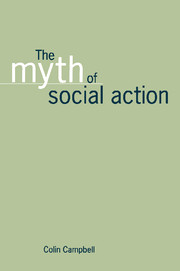Book contents
- Frontmatter
- Contents
- 1 Introduction
- 2 Action reported missing in action theory
- 3 Action and social action
- 4 Action versus social action
- 5 The rise of social situationalism
- 6 The argument by denial
- 7 Accounts and actions
- 8 The argument by exclusion
- 9 The argument through incorporation
- 10 The ‘learning everything from others’ thesis
- 11 The communicative act paradigm
- 12 The linguistic turn for the worse
- 13 The myth of social action
- 14 The obstacle which is social situationalism
- 15 Epilogue: bringing action back in
- Notes
- Bibliography
- Index
6 - The argument by denial
Published online by Cambridge University Press: 07 May 2010
- Frontmatter
- Contents
- 1 Introduction
- 2 Action reported missing in action theory
- 3 Action and social action
- 4 Action versus social action
- 5 The rise of social situationalism
- 6 The argument by denial
- 7 Accounts and actions
- 8 The argument by exclusion
- 9 The argument through incorporation
- 10 The ‘learning everything from others’ thesis
- 11 The communicative act paradigm
- 12 The linguistic turn for the worse
- 13 The myth of social action
- 14 The obstacle which is social situationalism
- 15 Epilogue: bringing action back in
- Notes
- Bibliography
- Index
Summary
By subscribing to the new situationalist orthodoxy sociologists have presented themselves with a difficult problem. Common sense (as well as their own personal experience) strongly suggests that the subjective meanings located in the minds of individuals are critically implicated in the construction and accomplishment of human actions. To focus instead upon ‘social’, situationally defined actions and their meanings, sociologists need powerful arguments which can undermine such ‘common sense’ notions. This was indeed what happened in the 1970s and early 1980s when material from philosophy was drawn upon both to justify the increasingly popular micro-perspectives, but also and more importantly, to undermine and discredit traditional action theory assumptions. At that time, there was some debate between representatives of the old and new orthodoxies, with arguments assessed and exchanged, even if, to a considerable extent, this was a dialogue of the deaf. Today, however, such debate has largely died away, allowing the beliefs which underpin social situationalism to solidify into dogma. It is therefore vitally important to identify and challenge those arguments which situationalists employ in their efforts to marginalise or otherwise exclude the study of subjective meaning from the subject-matter of the discipline. There are, in essence, three main strategies which situationalists have adopted. They amount to arguing: (1) that it doesn't exist; (2) that its study is not part of sociology; and (3) that it is really subsumed under the heading of ‘social’ or ‘intersubjective’ meaning.
The first of these, the ‘argument by denial’, involves the simple assertion that there are no subjective states relevant to the performance of actions.
- Type
- Chapter
- Information
- The Myth of Social Action , pp. 52 - 62Publisher: Cambridge University PressPrint publication year: 1996



